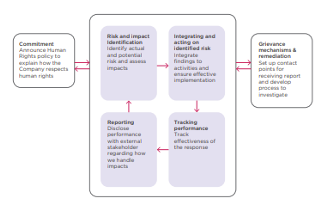
Human Rights
Human Rights

Significance & Commitment
Human rights impacts can create severe adverse consequences for the Company’s reputation and business operations.
Throughout the Company, it is essential to respect human rights, freedom, and equality by disclosing how the Company addresses potential impacts on human rights, including how the Company prevents and mitigates such impacts.
Management Approach
The Company is committed to respecting human rights in accordance with the Universal Declaration of Human Rights (UDHR), the United Nations Guiding Principles on Business and Human Rights (UNGPs), the ILO Declaration on Fundamental Principles and Rights at Work and the United Nations Global Compact (UNGC), including local regulations as stated in the corporate human rights policy. In practice, the Company adheres to the principles of liberty, equality and human dignity and shall not discriminate against gender, race, religion, and color in order to prevent and avoid human rights violations among employees, partners, customers, contractors, suppliers, communities, and vulnerable groups namely children, women, the disabled, indigenous peoples, migrant workers, and the elderly.
The Company has announced the human rights due diligence manual as a framework for assessing human rights risks across the business supply chain. The Company also has a grievance mechanism in place, comprising various channels for different types of complaints and stakeholders.

Human Rights Due Diligence
Adhering to the principles of UNGP, the Company had developed a human rights due diligence manual. This manual outlines a structured approach consisting of scope identification, issues and stakeholders’ identification, risk and impact identification, mitigation of impacts to an acceptable level, remediation, monitoring and reporting as well as grievance mechanisms. In order to identify human rights related issues, the Company considers not just the general issues specified in UNGP principles but also the specific risks of each business and each local operation.
Example of Human Rights Issues Related to Power Business
Equality, Non-discrimination, and Security of Person
Labor Rights
Housing, Land Acquisition and the Environment
Community and Cultural Rights
· Right to life, liberty, and security
· Right to equality, non-discrimination and inclusion
· Freedom from Violence, Conflict, Harassment and Bullying
· Freedom from Interference with Privacy
· Freedom from interference with privacy
· Right to complain
· Prevention of human trafficking, force labor and child labor
· Freedom of association and rights to collective bargaining
· Occupational health and safety
· Right to adequate housing and resettlement
· Right to relocation
· Right to a clean and healthy environment
· Right to participate in the cultural life of community
· Respect indigenous people
Year in Review
In 2023, the Company conducted a comprehensive human rights risk and impact assessment. The assessment focused on the renewable power business in Vietnam and a joint-ventured in thermal power business in Thailand. The findings from this assessment revealed that most identified human rights issues posed low to medium risks. However, there were 6 issues identified as high-impact risks. Recognizing the seriousness of these findings, the Company has proactively developed and implemented mitigation plans to minimize the potential adverse impact. Furthermore, Banpu Australia, a subsidiary in Australia, announced its third Modern Slavery Statement in 2023. As part of this statement, Banpu Australia commits to recognize the risk of modern slavery occurring both directly and indirectly across its supply chain. Banpu Australia has conducted risk assessments for its local and international suppliers. The outcomes indicate that the risks of modern slavery violations within the supply chain were low.
